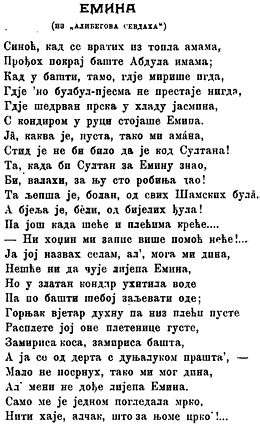Emina (poem)
"Emina" (Serbian Cyrillic: Емина) is a poem by a Bosnian-Serb poet Aleksa Šantić that became a popular sevdalinka song, covered by many prominent singers from Bosnia and Herzegovina and other parts of former Yugoslavia. It was first published in 1902 in the Serbian literary journal Kolo.[1] The subject of the poem is Šantić's neighbor, a Bosnian Muslim[2] girl named Emina Sefić. It is one of the most well-known sevdalinka songs of all time.
Main character
Emina Sefić (later Koluder; 1884–1967)[3] was born to a Bosnian Muslim family in the city of Mostar. Her father was a prominent imam and the family lived near Stari Most; they were next door neighbors to poet Aleksa Šantić. Her great-granddaughter Alma Ferović is a soprano and has performed with Elton John and A.R. Rahman.[4]
Statue
On 27 May 2010 a bronze statue of Emina was unveiled in Mostar. It was unveiled on Šantić's 142nd birthday, although it's not publicly known if that was intentionally done or coincidental.[5] The Emina statue was sculpted by Zlatko Dizdarević over the period of three months and was not based on photographs of her, rather the artistic vision of a Bosnian beauty. The statue was sculpted with clothing that women wore in Bosnia and Herzegovina at the turn of the century.
Lyrics

| Serbo-Croatian | English translation[6] |
|---|---|
|
|
Many artists have covered the song, but the version by fellow Mostar native, Bosnian singer Himzo Polovina, remains the most popular.[7] Upon hearing of the death of Emina Sefić, Polovina went to poetess Sevda Katica's home in the Mostar neighbourhood Donja Mahala. He found her in the yard of the family home, informed her of Emina's death and she shuddered with grief and spoke the verses:
| New verses | Translation |
|---|---|
|
|
Himzo Polovina recorded the song and added Sevda's new verses.
Legacy
Some have suggested adopting the words from "Emina" as the lyrics for the wordless Bosnian national anthem, due to its connection to Bosniaks, Croats, and Serbs (the three main Bosnian ethnic groups) alike.[8]
Covers
- Amira Medunjanin
- Divanhana
- Himzo Polovina
- Maja Milinković[9]
- Ibrahim Jukan
- Ibrica Jusić[10]
- Nedeljko Bilkić[11]
- Nihad Hrustanbegovic
- Saša Matić
See also
- List of Bosnia and Herzegovina folk songs
- Sevdalinka
- Kraj potoka bistre vode
- Moj dilbere
- Sejdefu majka buđaše
References
- Aleksa Šantić (1902). Danilo A. Živaljević (ed.). "Емина" [Emina]. Kolo (in Serbian). Belgrade: Štamparija Petra Ćurčića. 4 (3–4): 134.
- "Il volto di Šantić". Balcancaucaso. 1 August 2013. Retrieved 9 August 2013.
... poesia che Aleksa Šantić dedicò ad una ragazza musulmana...
- "Unuk "Lijepe Emine": Moja nena bila je uvijek vedrog duha". lupiga. 20 November 2006. Retrieved 28 December 2012.
- ""Emina" mi je uvijek donosila sreću". Slobodnaevropa. 2 January 2012. Retrieved 9 August 2013.
- "DOBRO DOŠLA KUĆI, LIJEPA EMINA". Dnevni list. 28 May 2010. Retrieved 28 December 2012.
- Aleksa Šantić (1902). "Emina - Aleksa Šantić - English translation". SpiritofBosnia. Retrieved 28 December 2012.
- "Zaboravljeni junaci jednog vremena". doznajemo. 22 November 2012. Archived from the original on 11 April 2013. Retrieved 28 December 2012.
- "Bosnia's National Anthem Remains Lost for Words". Balkan Insight. 7 February 2018. Retrieved 29 April 2019.
- Emina, retrieved 2020-04-28
- "Bolje da ne pevaš". dw.de. 12 July 2013. Retrieved 9 August 2013.
- "Un sentimento bosniaco". Girodivite. 31 October 2008. Retrieved 9 August 2013.